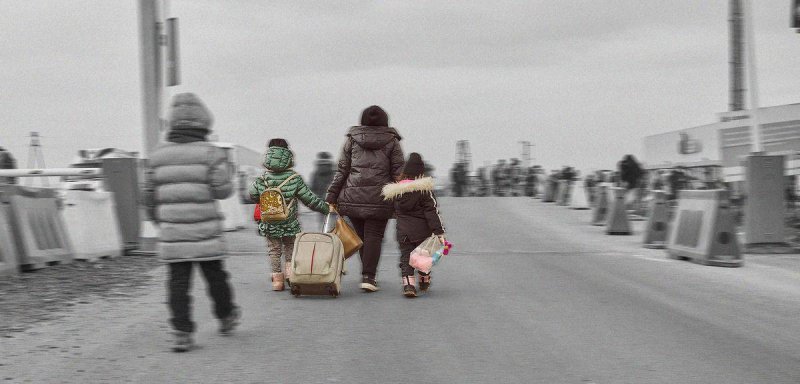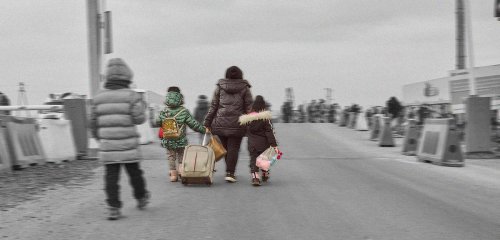When we rushed to the Ukrainian border in the early days of the war, we did not pay much attention to any details or issues other than the evacuating of those who were fleeing the war, securing them at the nearest point of safety, because no voice is louder than that of a distressed person’s cry for help while carrying a child, a bag, and a thousand scenes of blood and war on their shoulders.
Last week, I headed to the Hungarian-Ukrainian border as part of a volunteer team, and unlike previous occasions, the calm along the borders had been an opportunity to find out all the flaws in the Ukrainian story of asylum-seeking, and stand face to face with the headlines and scenes of racism that had rained down on us during the first weeks of the war.
I remembered it all, as if the border crossing had a giant written sign above it saying: Attention: Here is the check-point separating the blue from the dark eyes.
We spent around two hours at the border without doing anything, due to the large number of volunteers there, not to mention that the incoming flow of the displaced was similar to the traffic at the arrivals gate at Damascus International Airport in 2015, with 10 people coming through every hour, with half of them being airport staff. But what was more remarkable was the emergency relief situation, where one could clearly see the presence of considerable amount of aid and volunteer teams for the three families in the “camp” on the border.
A one star refugee
The first impression of this “situation” had been a positive one — and even impressive— but the lack of “refugees” who needed to be aided by this great army of rescuers turned this state of astonishment and wonder into a feeling of sorrow, akin to the choked up feeling a thirsty person experiences while seeing someone wasting water. These scenes stirred my emotions, as a Syrian seeing what’s happening to fellow Syrians at the borders of nations that they had spent money and blood in order to reach.
I walk with another volunteer, who is of Nigerian origin. We share the gloom and bleakness of being in the lowest ranks according to the “classification of the distressed” which is nationality based. He tells me about a Nigerian who arrived about a week ago to the border and asked him to help him with the procedures, “He felt the “quality” of the emergency relief that was provided him had been noticeably lower than that provided for the Ukrainians, after the border guards forced him to wait for an entire day just to give priority to Ukrainians, and every time he reached the gate, they asked him to return to the end of the queue, on the pretext that his embassy’s representative had not yet arrived to take and register his data.”
He added, “He knew that these excuses didn’t make any sense, since there is no need for the presence of an embassy representative at the border, and many of those who came did not have embassies for their countries in Hungary.”
Human rights charters don’t include everyone
There were United Nations banners everywhere. The slogans of its humanitarian coordination offices surrounded the border strip. On one of its cars the word “Respect” was written with the Universal Declaration of Human Rights (UDHR) under it — the very same declaration that states in its first and second articles: “All human beings are born free and equal in dignity and rights. Everyone is entitled to all the rights and freedoms set forth in this Declaration, without distinction of any kind, such as race, colour, sex, language, religion, political or other opinion, national or social origin, property, birth or other status. Furthermore, no distinction shall be made on the basis of the political, jurisdictional, or international status of the country or territory to which a person belongs.”
Moments later, a UN car arrives and a person who looks like a supervisor or manager gets out, and then all the UN team coordinators head over towards him. Here, my Nigerian friend whispers in my ear, “See that guy? He is the representative of the United Nations Office for the Coordination of Humanitarian Affairs. Last time he gave a speech to everyone here and drilled it into our heads to provide assistance to those in need quickly and without any discrimination, and on the same day the incident with the Nigerian young man took place.”
Eating grass
Both sides of the road were lined with relief cars from organizations that provide food and drink to those who have arrived. One of them had the word “VEGAN” written on it. I initially thought that the word had another meaning than “vegetarian”, but it turned out that it was. Turns out, the car was waiting for a Ukrainian refugee who was vegetarian in order to offer him food without disturbing his health regimen.
A Syrian friend spent days at the Serbian border as a vegetarian, literally, eating plants and weeds yet here humanitarian organizations had Vegan options for Ukrainian refugees.
I looked closely at the car, and my memory takes me back to a scene where a Syrian friend spent two days at the Serbian border as a vegetarian. But he had been a vegetarian in the literal sense of the word. He ate plants and weeds while fleeing from Serbian border guards who were going to send him back to Greece instead of allowing him to cross into a European country that would grant him asylum.
A Hungarian friend of mine asks me, “Why do you look so closely at this ‘VEGAN’ car?”
I answer her as someone who had been looking with one eye, an eye that is grateful for this organization that has thought of a small group of people and decided to provide specific nutrition for their comfort and convenience. I set aside the other eye that was saturated with tears, and informed her of my admiration for the VEGAN car, because I was sure that revealing my pain and sorrow would not do any good. She would not have understood it, and perhaps she would have considered me ungrateful.
Apart from the double standard of emergency relief and Syrian grief, the intensified aid and assistance at the border crossings in a way that exceeded the needs there, has had a negative impact.
According to testimonies obtained by Raseef22 from border volunteers, cases of illegal use of aid were recorded by tracking people who come to the borders on a weekly basis and cross ack after receiving aid. Some of them were spotted by volunteers at more than one border crossing.
First-hand experience
Empathizing with those fleeing the horrors of war is a sacred thing, its sanctity derived from our humanity, and we — the sons of the Syrian Nakba — are aware of the pain and bitterness of displacement and empathize with those who have been displaced by war more than anyone else, but being classified as a third world — even in moments of rescue, relief, and assistance — is not something that any logic or law can accept.
Nor can our memory that has been burdened with a thousand stories of suffering on the Belarusian border, and dozens of bloody photos on the shores of Greece and Turkey. Nor can that memory erase the scenes of relief teams and organizations that on many occasions extended their arms to a drowning person without waiting for him to float to the surface and see the color of his skin or the color of his eyes.
Raseef22 is a not for profit entity. Our focus is on quality journalism. Every contribution to the NasRaseef membership goes directly towards journalism production. We stand independent, not accepting corporate sponsorships, sponsored content or political funding.
Support our mission to keep Raseef22 available to all readers by clicking here!
Interested in writing with us? Check our pitch process here!






